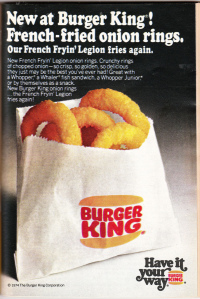Burger King’s Largest Franchisee Blames Local Ad Cuts For Lower Sales
The idea was pretty simple: whatever local franchisees spent on marketing, Burger King would match it. Carrols notes that while they’ve served fewer customers overall compared to the same period last year, the average guest check is higher. That makes sense, since they’re doing fewer low-price promotions intended to get people inside the door.
Still, that ad-matching money was very important. In a press release about their last quarter’s results, the company pointed directly at Burger King corporate:
Our sales trends were weaker than anticipated in the second quarter due to several factors, but we believe were most significantly impacted by a reduction in spending on local advertising compared to the second quarter of 2013. Burger King Corporation’s (“BKC”) non-renewal of a matching contribution program impacted the advertising spending in a number of our markets.
A company spokeswoman clarified to Businessweek that all franchisees kick in some money for national advertising, and Burger King as a whole decided to focus more on national advertising than local and regional advertising. Carrols operates Burger King restaurants in much of the eastern half of the country, and is Burger King’s largest franchisee.
Incidentally, Burger King itself owns 28.9% of Carrols, turning this whole thing into an ouroboros of advertising cuts and bad marketing decisions.
Burger King’s Local Ad Cuts Hurt Restaurants [Bloomberg Businessweek]
Carrols Restaurant Group, Inc. Reports Financial Results for the Second Quarter of 2014 [Press Release]
Want more consumer news? Visit our parent organization, Consumer Reports, for the latest on scams, recalls, and other consumer issues.


